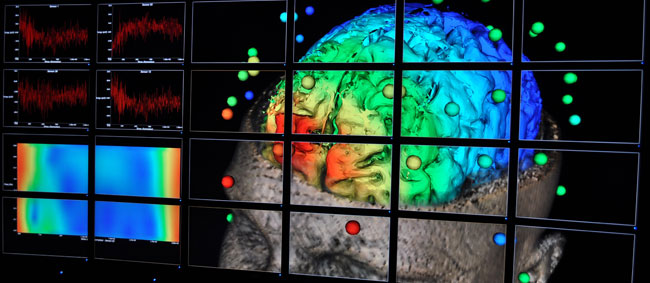Conquering the Digital Data Overload

If you're feeling a little overwhelmed by all the information you have to keep track of, you're not alone. Between the proliferation of 'smart' devices — ranging from phones to power grids — and the ever-growing Internet, the world is drowning in data. But not to despair, computer scientists like Juliana Freire are trying to help us gather and make sense of this modern monsoon of data. A computer scientist at the University of Utah, Freire's work centers on finding data that might otherwise be missed, as well as integrating and managing that data into knowledge that people can actually use. She and her collaborators have created the DeepPeep project, an attempt at integrating typical web-based data with other databases that are publicly available, but not easily found through standard methods like online searching. Freire has also created a tool called VisTrails that allows users to take several computers and 24 large, flat-screen video monitors and produce a single high-resolution visualization, such as the brain's vascular system or the dynamics of an erupting volcano. For more about the work, see the recent NSF Discovery feature story. For more on Freire, see her answers to the ScienceLives 10 Questions below.
Name: Juliana Freire Age: 38 Institution: University of Utah Field of Study: Computer Science
What inspired you to choose this field of study? I have always enjoyed math and science. So when I was choosing my major, I had a hard time deciding whether to go into computer science or medicine. In the end, it was a coin toss. It was during my Ph.D. that I actually realized the importance of computer science, in particular information management and the great potential it has for practical impact.
What is the best piece of advice you ever received? Fresh out of grad school, I joined the Database Systems group at Bell Labs, which at that time was the research arm of Lucent Technologies. On my first day at work, I asked my manager what I should do. He simply replied: "Work hard and be famous." My interpretation of the "be famous" part is that one has to choose real and important problems to work on.
What was your first scientific experiment as a child? I used to love disassembling and assembling things, for example, telephones, AM/FM radios and toys. I was definitely better at disassembling — often there were extra parts left after I was done…
What is your favorite thing about being a researcher? Always working on (and learning) new things; and interacting with students and watching them develop into colleagues.
What is the most important characteristic a researcher must demonstrate in order to be an effective researcher? If I have to name one, I would say persistence. But there are others — in particular, the ability to identify important, worthy problems.
Sign up for the Live Science daily newsletter now
Get the world’s most fascinating discoveries delivered straight to your inbox.
What are the societal benefits of your research? The focus of my research has been to simplify the process of finding, gathering, integrating, managing, analyzing and visualizing information. The potential benefits to society come from the ability to better leverage the large volumes of digital data currently available.
Who has had the most influence on your thinking as a researcher? I cannot single out a person. There have been several senior people in my community who have in different ways influenced my thinking and approach to research.
What about your field or being a researcher do you think would surprise people the most? That computer scientists do not spend all day alone staring at a computer and typing. On the contrary, most of my time is spent in meetings and interacting with others. Besides students and other computer scientists, I get to collaborate with many scientists in different fields.
If you could only rescue one thing from your burning office or lab, what would it be? My laptop!
What music do you play most often in your lab or car? Mozart and Bossa Nova.
Why is yawning contagious?
Scientific consensus shows race is a human invention, not biological reality









